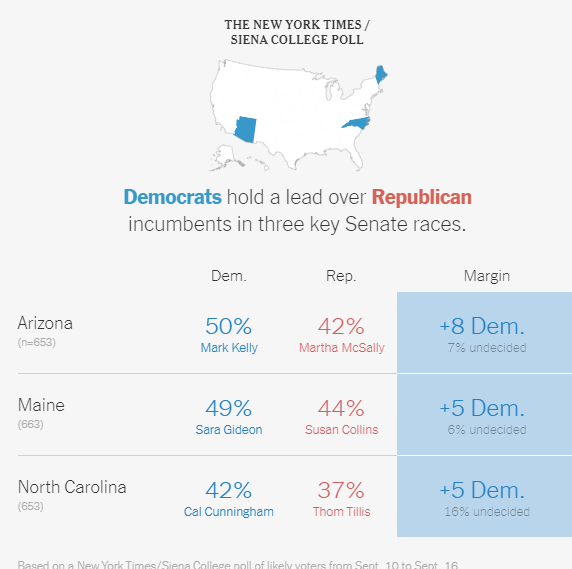Well, we are frankly quite blown away by the response to our new Bulwark+, and delighted that so many of you are deciding to join with us as we grow. Thank you!
If you haven’t done so yet, you can sign up here.
September 18, 2020
It’s almost like it’s a pattern: even more high-ranking Trump Administration officials break with the president. Joe Biden resets the expectations game. The president rips his own FBI director. And new polls have more bad news for Trump’s GOP.

Welcome to the Daily Countdown. We have 45 days to go until election day; and then 78 days after that until Inauguration Day.
I keep thinking about my conversation the other day with Time magazine’s Charlotte Alter, who has spent the last few weeks on the ground here in the Midwest. It has not always been an edifying experience.
Political elites and pundits would like to believe that voters deploy something like a rational process when they make political decisions. But, as Alter found when she talked with actual voters here, that’s not always the case. Those of us still clinging to the notion of self-government would like to think that the average voter reasons from A to B to C, but, she says, but the thought process is more lie “A leads to purple, which leads to banana, which leads to eight.”
“Sometimes in the media we have this assumption that by writing this story you will change minds,” she said. We imagine that stories about disrespecting war dead will cause veterans to dislike Trump; or that writing stories about all of the women who have accused Trump of sexual assault will cause women to turn against Trump; or that stories about how he downplayed the coronavirus will change voter perceptions.
But, she says, “the idea that this information leads to this opinion is broken.”
So what actually happens? How do we get to banana?
“That’s one of the most challenging things about this,” she told me. “I think of it as a kind of unlogic. There is no way to get to the banana, because I could talk to one person where A leads to purple, which leads to banana; and I could talk to their friend who thinks A leads to the Beatles, which leads to chicken soup.”
“I talk to some voters who have very established reasons for why they think what they think and it tracks logically. I talk to other people — and not even QAnon people — for whom something has short-circuited in the way that they are making these decisions, and the way they are thinking about this.”
She compares the level of disruption to the American Revolution. (She’s been watching “Turn” on Netflix.)
“The thing that I keep thinking about… is that one of the things that we learn about the Revolutionary war is that in some ways it was also a war between order and chaos.
“The Redcoats were like ‘we've got five lines of 30 men; our cannons are all pointed due north; and the enemy will never take our mighty fleet.’”
In contrast to the linear approach of the British, “the revolutionaries were a sort of ragtag band of rebels, and they attacked them from the side, they attacked them from behind trees. They hid under hay bales…. They were impossible to predict, and it was ultimately a battle between order and chaos.”
“I think that's been one of the things that has been sticking out to me this trip: I don't think that this election is a contest really between Democrats and Republicans,” she said. “I think it's a contest between order and chaos.”
This makes everything so unsettled, “because chaos is impossible to predict,” and the political playing field is not level. One side “has a much narrower field that they can fight on because they're constrained by rational constraints and guilt,” while the other side can live in a world of its own making.
She thinks that makes Biden “uniquely vulnerable to an October surprise in a way that Trump is not,” because there is no information that will come out about Trump that will change his supporters’ minds. Even if we had a video of Trump shooting someone on 5th Avenue, she said, there would be “a certain core portion of his voters will not only still vote for him, they'll be more excited to vote for him because they'll think that the video was faked, and it was evidence of some plot to get him.”
You can listen to the whole thing here.
Biden shows up.
ICYMI last night, the Joe Biden who showed up for a CNN town hall was not the one we had been promised by the Trump campaign. Biden may not have been flawless, but he was certainly not the senile, doddering can’t-string-together-a-coherent-thought dotard that Trump has spent months telling us about. He was actually pretty good, at times actually quite sharp.
One of his better lines:
How well did it go? The Trump fluffers were livid.
Or, as the Greek philosopher Democritus might have said: Heh.
It’s almost like there is a pattern.
Look, by any standards what is happening here is remarkable. One after another, Trump Administration officials are coming forward to warn the country that their former boss is dangerously unfit.
This has never happened before on this scale.
Stop what you are doing now and watch this video:
Susan Glasser writes in the New Yorker:
Every Presidency has its dissenters, people who leave and tell tales after they do so. But there has never been anything like the stories that have emerged from the Trump White House, from so many who worked with the President and observed him up close. People like his former national-security adviser John Bolton, who called Trump “unfit” for office. And people like the former Secretary of Defense Jim Mattis, the former White House chief of staff John Kelly, and the former director of National Intelligence Dan Coats, all of whom have relayed grave concerns about Trump that have made their way to Bob Woodward and other journalists.
In the end, this is what struck me most during my conversation with Troye: she is young, only forty-three years old, with a long career ahead of her, and she was willing to put it all on the line publicly, whereas people like Mattis and Kelly were not.
There’s more. The former chief of staff to Ed Secretary Betsy DeVos is also speaking out.
Josh Venable, the former chief of staff to Education Secretary Betsy Devos, has joined another former Trump administration official's group opposing the president.
Venable is lending his name as an adviser to the Republican Political Alliance for Integrity and Reform, a group former Department of Homeland Security official Miles Taylor launched on Thursday of current and former Trump administration officials and other Republican leaders who want to see President Donald Trump defeated in November.
Again, there’s a pattern here. But there’s nothing normal about it.
Trump is an anchor for the Senate GOP.
President Trump’s mismanagement of the coronavirus pandemic has imperiled both his own re-election and his party’s majority in the Senate, and Republican lawmakers in crucial states like Arizona, North Carolina and Maine have fallen behind their Democratic challengers amid broad disapproval of the president, according to a poll conducted by The New York Times and Siena College.
Here’s how it looks:

Speaking of Wisconsin…
Two stories that are worth your attention:.
First is this on-the-ground report from my own neighborhood in Ozaukee County by Politico’s Tim Alberta:
Like nearly every person I met in Cedarburg, she spoke of a city 60 miles south: Kenosha. After the police shooting of Jacob Blake, an unarmed Black man, a mix of demonstrations—many peaceful, some violent—engulfed the city’s streets, bringing the summer of social unrest that much closer to home for the suburbanites of the WOW counties.
Second, this report of Democratic angst: “Dems fear Wisconsin governor is becoming a liability for Biden.”
“I don’t think that he has his pulse [on] what is going on in this state. He doesn’t have a forceful personality. He doesn’t have, in my view, the qualities of a great leader and that’s what we need now,” said Terry Rose, a county supervisor and former Democratic Party chair in Kenosha County. “We need a Winston Churchill, not a Neville Chamberlain.”
**
Biden’s new ad.
Whoa.
There are 45 days to go.
Quick Hits
1. Don’t Let Iran Get Away with Murder
Shay Khatiri writes in today’s Bulwark:
Last Saturday, Iranian media reported that Navid Afkari, a wrestler who had won medals in Iranian and international matches, had been executed. His killing is a sick mockery of justice—a state-sanctioned murder intended to terrorize Iranian dissidents. While it doesn’t reveal anything we didn’t already know about the depravity of the Iranian regime, the circumstances of his death deserve particular attention from international observers—and cry out for them to take action.
Cheap Shots
1. History Lessons
2. Déjà vu
Deep Thoughts
1. What In Conservatism Should Be Conserved?
Thoughtful piece by Martin Skold and J. Furman Daniel in this morning’s Bulwark.
In a previous Bulwark article, we asked what was left to conserve about the United States, and offered some thoughts on what could form the basis of conservatism in the present era. We pick up here with an opposite question: What must we conserve about conservatism, and what must change?
This is no mere academic exercise. Our cities are burning, our people are divided, our foreign policy is adrift, and our nation is literally sick.
Some of the blame for these problems belongs to the left, but by no means all of it. For a two-party system like ours to function properly it must have a viable and healthy conservative party. America needs a governing consensus, so that it can know what is too much and what is not enough, what is on the table and what is not—and that implies having both a liberal or progressive party and a conservative party, and between them some sort of consensus about the boundaries of the policy debate.
These failures of ideas and leadership were evident long before the 2016 election. While Donald Trump, as a candidate and as president, has been able to exploit the country’s polarization, it did not originate with him. Moreover, should he recede from the scene, it will be more, not less, necessary to attempt to make some sense of a chaotic Republican party. Doing so will require reassessing what about the old conservatism retains relevance and vitality.





